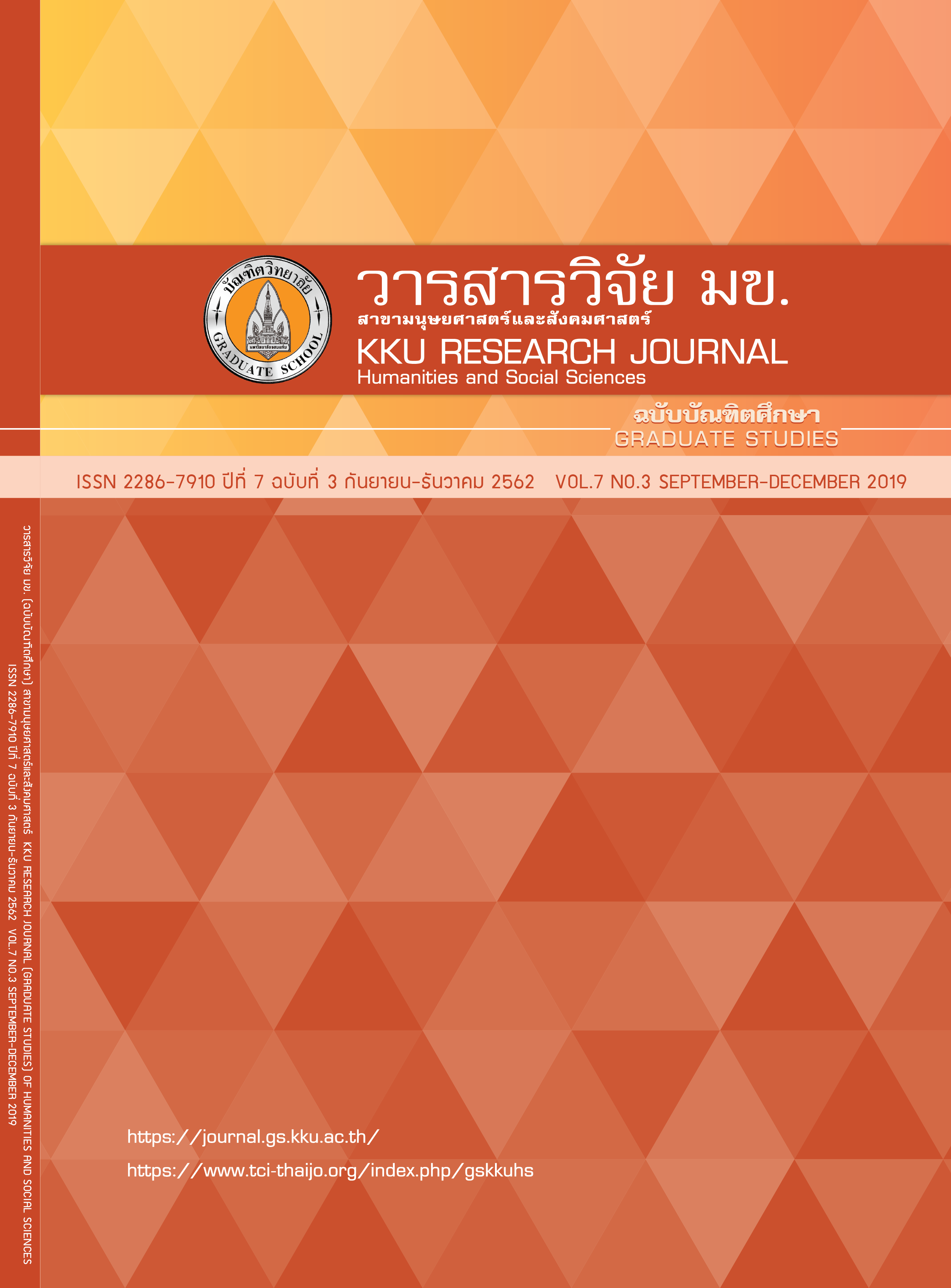องค์ประกอบความสุขของครอบครัวข้ามรุ่นในชนบทอีสาน
คำสำคัญ:
ความสุข, ครอบครัวข้ามรุ่น, ชนบทบทคัดย่อ
บทความวิจัยนี้มุ่งศึกษาองค์ประกอบความสุขของครอบครัวข้ามรุ่นในชนบทอีสาน โดยใช้ระเบียบวิธีวิจัยเชิงคุณภาพ มีหน่วยในการวิเคราะห์ 2 ระดับ ได้แก่ (1) ระดับชุมชน มีผู้ให้ข้อมูลประกอบด้วย ผู้นำชุมชน ผู้อาวุโสในชุมชน และคณะกรรมการชุมชน จำนวน 8 คน (2) ระดับครอบครัว มีผู้ให้ข้อมูลประกอบด้วยครอบครัวข้ามรุ่นที่มีลักษณะการอยู่อาศัยแตกต่างกัน จำแนกตามจำนวนสมาชิกในครอบครัว ทั้งหมด 20 ครอบครัว ในตำบลโอโล อำเภอภูเขียว จังหวัดชัยภูมิ โดยใช้เทคนิคการสัมภาษณ์เชิงลึก ผ่านแนวทางการสัมภาษณ์ในการเก็บรวบรวมข้อมูล และนำข้อมูลมาใช้ในการวิเคราะห์ข้อมูลเชิงเนื้อหา เพื่อหาข้อสรุปจากปรากฏการณ์ เก็บรวบรวมข้อมูลตั้งแต่เดือนพฤษภาคม-กรกฏาคม 2561 ผลการวิจัยพบว่า องค์ประกอบความสุขของครอบครัวข้ามรุ่นที่มีสมาชิกย้ายถิ่นไปทำงานในต่างประเทศ ประกอบด้วย 3 องค์ประกอบ คือ (1) บ้านน่าอยู่ (2) รู้จักตน และ(3) คนน่าคบ ทั้งสามองค์ประกอบนี้เป็นสิ่งที่ใช้สะท้อนการแสดงออกถึงความสุขของครอบครัวข้ามรุ่น ที่ใช้ชีวิตอยู่ในสังคมชนบทอีสาน
เอกสารอ้างอิง
Integration. in Punpuing, S. and Sunpuwan, M., 1st ed. Thailand's Population in
Transition: A Turning Point for Thai Society. Nakhonpathom: Institute for Population
and Social Research: Mahidol University; 2011, p. 67-84.
2. National Statistics Office. The 2016 Report. Bangkok: National Statistics Office,
Ministry of Digital Economy and Society; 2016.
3. Ayuwat D. The fee setting for Thai labourers working abroad. International
Business Management. 2015; 9(3): 232-238. Thai.
4. Boonkwang P. Household Security of Isan Migrant Workers Working Abroad.
Nakhon Phanom University Journal. 2017; 7(2): 108-115. Thai.
5. Narongchai W. Patterns of Co-resident of Skipped-generation in Isan
Migrant Family [MA thesis]. Khon Kaen: Khon Kaen University; 2011. Thai.
6. Wasanthanarat C. Organization of Happiness in 8 Perspectives. Folk
Doctor Journal. 2008; 30(349): 18-25. Thai.
7. Organization for Economic Co-operation and Development. OECD Guidelines
on Measuring Subjective Well Being. Paris: OECD; 2013. 139 p.
8. Department of Mental Health. Happiness Guidelines in the provincial
level; 2011. 16 p.
9. Sonman K. The Factors of Worker Migration in the Republic of Korea and
the Pattern Relationship between Workers and Relatives. Journal of language,
religion and culture. 2013; 2(2): 167-180. Thai.
10. Potisita C. Thai Family in the Social and Population Transitions. Journal of
Population and Social Studies. 2011; 3(1): 23-41. Thai.
11. Jampaklay A, Vapattanawong P, Tangchonlatip K, et al. Children Living Apart
from Parents due to Internal Migration: CLAIM. 1st ed. Nakhonpathom: Institute for
Population and Social Research:: Mahidol University; 2013, p. 8-9.
12. Miles B, Huberman AM. Qualitative data analysis: An expanded sourcebook.
2nd ed. Thousand Oaks, CA: Sage Publications; 1994.
13. Piromkipuk K. Happiness of people between mandamunkong community
and promma community Chachoengsao Province [MA thesis]. Chonburi:
Burapha University; 2014. Thai.
14. Khamwong C. Comfort and its selected factors related to comfort of elderly
patients undergone operation with spinal anesthesia [MSc thesis]. Chonburi:
Burapha University; 2014. Thai.
15. Jundaharn M. The Happiness Obtained from Self-Reliance Practice in the
Latest Stage of Life of Elderly People in Rural Communities of Phu Ruea District,
Loei Province [MA thesis]. Nonthaburi: Sukhothai Thammathirat Open University;
2015. Thai.




